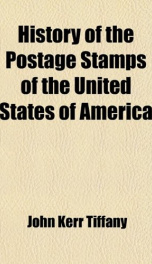history of the postage stamps of the united states of america

Purchase of this book includes free trial access to www.million-books.com where you can read more than a million books for free. This is an OCR edition with typos. Excerpt from book: 11. Uniform Postage, The '"arrangement" put in operation in New York does not seem to have been a great success for it was not extended to other cities, and local posts continued to flourish and do the work at less than the government rates. The demand for better service and lower rates, for "reform" as it was called grew louder and louder, until the Postmaster General in his report dated November 25th, 1844, recommended to Congress a reduced uniform rate according to distance and weight. Stamps were recommended but only for use on foreign letters. The bill which was introduced in Congress in pursuance of this recommendation provided, it is said, both for obligatory prepayment and the use of postage stamps. But there was great hesitation in adopting the English system in the United States ; the conditions were considered to be so different; the the distances were so great that a greater rate was necessary; the country was so new that the risk from counterfeiting was much greater; the custom chapter{Section 4was not to prepay letters, and customis strongerthan aw. Such and like objections were raised and the aw passed without adopting prepayment by stamp, but the great principle of the reform, uniform rnte by distance and weight was adopted. The only portion of the law that is of interest here is the following section of the Statutes of the United States, XXVIII Congress, II Session, XLIII chapter, approved March 30, 1845. "From and after the first day of July next, members of Congress and Delegates from Territories may receive letters not exceeding two ounces in weight, free of postage during the recess of Congress anything to the contrary in this act notwithstanding ; and the same franking privilege which is granted by this act to the members of the two Houses of C...
Info about the book
Author:
Series:
Unknown
ASIN:
B007GN1BAC
Rating:
4/5 (4)Your rating:
0/5
Languge:
English
Users who have this book
Users who want this book
What readers are saying
What do you think? Write your own comment on this book!
write a commentif you like history of the postage stamps of the united states of america try:
Other books by this author
Do you want to exchange books? It’s EASY!
Get registered and find other users who want to give their favourite books to good hands!

